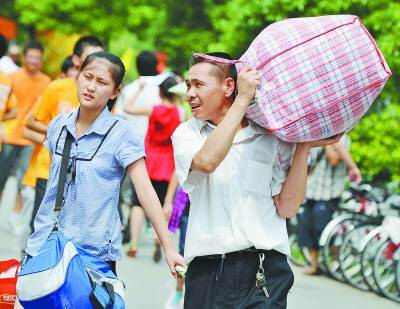The latest report by China Youth Daily suggests that it is not entirely fair to attribute the reduction of rural university students to the widening urban-rural wealth gap.
(Ecns.cn) – "More than 30 percent of our new students this year are from rural areas. The evidence is inconclusive that students from the countryside are dwindling at universities," Liu Bo, deputy principle of Southeast University in east China's Jiangsu Province, said on August 21.
Media reports earlier this month alleged that there were a decreasing number of rural students at prestigious universities such as Tsinghua and Peking University.
According to Southern Weekend, which quoted The Study on National Tertiary Education Fairness led by Professor Yang Dongping, only 17 percent of freshmen at Tsinghua University in 2010 came from rural areas, even though they comprised 62 percent of those registered to take the gaokao (national college entrance examination) that year.
The imbalance of educational resources and the reform of the gaokao to evaluate students on their "overall quality" are the causes of the reduction, the report concluded.
The exams are earmarked to test students on their knowledge base rather than academic performance, hence students who grew up in urban areas and have had access to a much wider range of knowledge and better study conditions hold the advantage over rural students.
The report gave an example of a student at Tsinghua University who comes from an impoverished rural family. She was asked in an exam about the university that Fei Xiaotong (1910-2005, a renowned Chinese sociologist and anthropologist) attended, but the student didn't even know who Fei was.
"They (high school students in Beijing or other big cities) knew the answer," Southern Weekend quoted the student as saying.
Wider sample required
According to Southern Weekend, the reduction of rural students may cause a widening gap, not only in terms of wealth, but also in knowledge and education between urban and rural areas.
However, some say the study is not altogether convincing, since it is based only on a group of students at Tsinghua and Peking Universities.
Those are the two most prestigious universities in China, so it is unfair to say that rural students are not getting admitted by other high-quality universities in the country, Liu said.
According to Liu, rural students have comprised around 30 percent of Southeast University's freshmen since 2008, a percentage that has remained stable. The percentage is even higher at Jiangsu-based Nanjing University of Aeronautics and Astronautics (NUAA).
Wang Hui, the student administration director at NUAA, a top-forty university in China, provided a record of student residence registration information from the past five years, which showed that more than 40 percent of its new students came from rural areas.
Statistics from Suzhou University, another top-forty university based in Jiangsu, also corroborated Liu Bo's statement, saying 44.7% of its new students in 2011 hail from the countryside.
The contrast between Beijing and Jiangsu reflects the unevenness of economic development in Chinese cities, according to Liu.
Despite being a major metropolis in the east, Nanjing has a relatively lower cost of living than Beijing or Shanghai amid the soaring inflation, he said. "That is why so many rural students choose to study at universities located in Jiangsu Province," he told China Youth Daily.


















